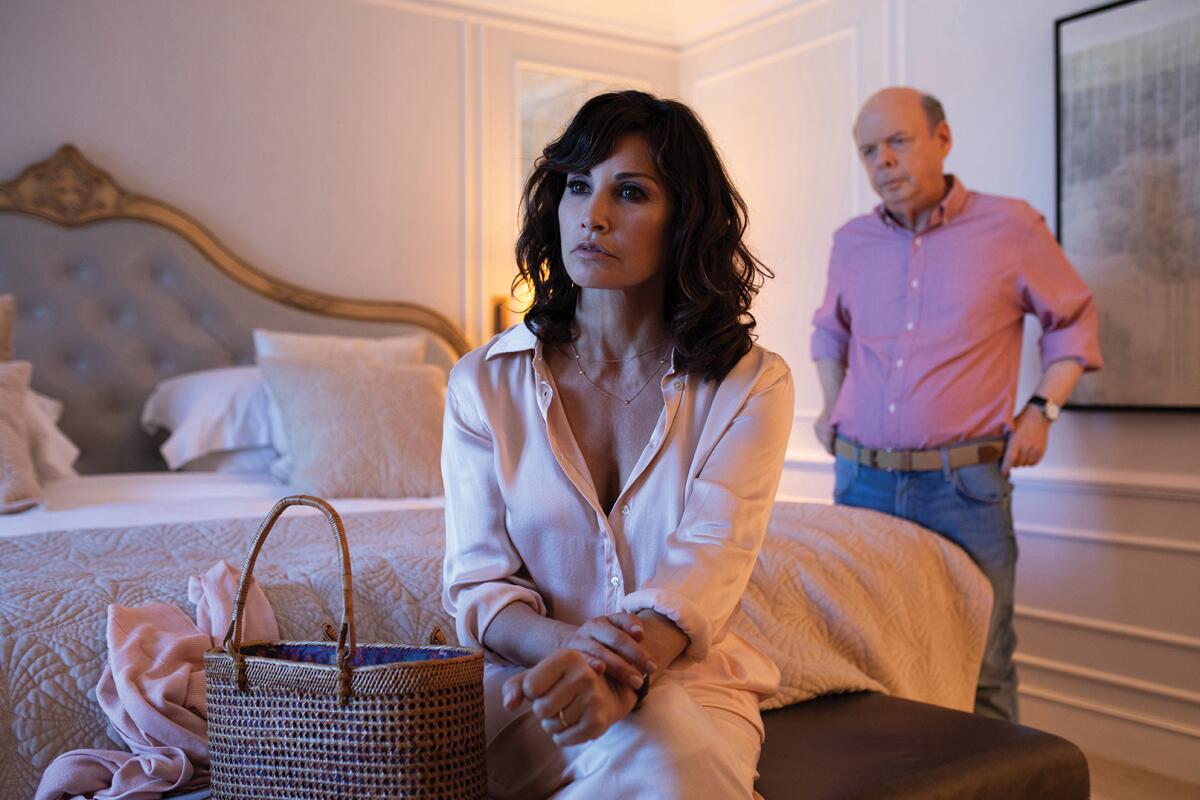Review: ‘Rifkin’s Festival,’ Woody Allen’s latest, may also be his worst

- Share via
The Times is committed to reviewing theatrical film releases during the COVID-19 pandemic. Because moviegoing carries risks during this time, we remind readers to follow health and safety guidelines as outlined by the Centers for Disease Control and Prevention and local health officials.
Woody Allen’s 49th feature, “Rifkin’s Festival,” is arguably his worst. The award-winning and prolific, yet also controversial filmmaker has little if anything new to offer here, rehashing already rehashed themes, attitudes, longings and gripes to dispiritingly diminishing returns. It’s even less inspired than his last picture, 2019’s “A Rainy Day in New York,” and that’s saying a lot.
Allen states that he chose veteran character actor Wallace Shawn, with whom he’d worked on “Manhattan,” “Radio Days” and other movies, for the lead role of retired New York film studies professor — and the writer-director’s latest proxy — Mort Rifkin because he wanted a “real intellectual” in the part. But Shawn, 75 when the film was shot in 2019, is so woefully miscast that no amount of cerebral panache (which barely registers here anyway) can make his drippy, charisma-free Mort someone whose pity party we want to attend. He’s described here as a “cranky little introvert” and it’s sadly apt.
The trifling, often anachronistic and artificial story finds Mort looking back — using excessive and largely needless narration — to a trip that he took with his glamorous publicist wife, Sue (Gina Gershon, a bright spot), to the San Sebastián International Film Festival, where her French director client, Philippe (Louis Garrel), is premiering a new work. But, as Mort admits to the shrink to whom he’s recounting his tale, he went not to watch movies or enjoy the beauty of the Spanish coastal resort town (vividly captured by ace cinematographer Vittorio Storaro of “Reds” and “Apocalypse Now” fame) but to keep an eye on Sue, whom he suspects of having a thing for the smoldering Philippe. (In typical Allen fashion, Philippe is much younger than Sue, who’s much younger than Mort.) It’s a wan and predictable setup.
Much of the film involves Mort killing time around San Sebastián while Sue is immersed in publicity duties — and maybe more — with Philippe. Film snob Mort may dislike the pretentious director’s buzzy new antiwar movie on mere principle but is, at heart, jealous of Sue’s barely concealed infatuation with the rising, self-possessed and attractive artist. That Mort is a would-be novelist, blocked by his inability — and a possibly self-sabotaging desire — to create something monumental a la Dostoevsky, only adds to his envy and angst.
But Mort gets a lift when he visits local doctor Jo Rojas (Elena Anaya) to assess his recently acquired chest pains and becomes smitten by the kindly, pretty, seemingly soulful physician. Like Mort, Jo is in a waning marriage; her husband (Sergi López) is a tempestuous, adulterous painter. So despite being another far-fetched match (Jo could technically be Mort’s granddaughter), he holds out a flicker of hope. But Mort’s strained efforts to get to know Jo, combined with the performers’ utter lack of chemistry and the contrivances of Anaya’s role, make for an awkward and implausible series of scenes.
Also ineffective are Mort’s string of dreams and mind’s-eye fantasies, each of which are black-and-white-rendered riffs on classic films by such masters as Jean-Luc Godard, François Truffaut, Ingmar Bergman and Luis Buñuel. What at one point in Allen’s long career may have felt clever and innovative simply comes off like a hoary device to pad an undernourished story. A late-breaking “Seventh Seal” sendup featuring Christoph Waltz as “Death” feels particularly gimmicky.
Overall pacing is flaccid and too many scenes peter out when they should punch. But perhaps the movie’s biggest infraction is that there’s hardly a chuckle in it. One bit, in which Mort wishes aloud that he’d hear from a “qualified physician,” might have been funny if it wasn’t such a brazen retread of the Marshall McLuhan moment in “Annie Hall.” (Ah, “Annie Hall”!)
Steve Guttenberg, Tammy Blanchard, Richard Kind and frequent Allen collaborator Douglas McGrath show up in small parts but, in general, one wonders if casting here is a matter of who, in a post-#MeToo era, will still agree to work with the director after his alleged personal transgressions. (He was accused in 1992 of sexually abusing his then-7-year-old adopted daughter; a judge later rejected the allegation.)
In his heyday, a Woody Allen film was an annual event to anticipate, celebrate and share. “Rifkin’s Festival” is simply something to endure — and for completists only.
'Rifkin’s Festival'
Rated: PG-13, for suggestive/sexual material and some drug use, language and thematic elements.
Running time: 1 hour, 32 minutes
Playing: Starts Jan. 28, The Landmark, West Los Angeles; also on VOD
More to Read
Only good movies
Get the Indie Focus newsletter, Mark Olsen's weekly guide to the world of cinema.
You may occasionally receive promotional content from the Los Angeles Times.









